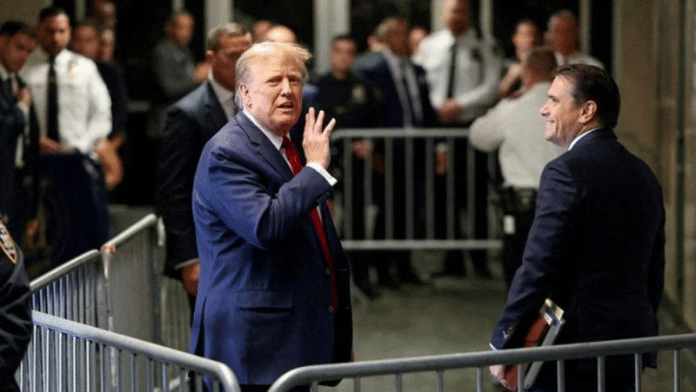New Delhi: Americans are cautious about some of US president Donald Trump’s early foreign policies, including the exit from World Health Organisation (WHO) and Washington DC’s handling of the ongoing Russia-Ukraine war, according to a latest Pew report.
Among Trump’s most controversial foreign policy moves, withdrawing from international institutions continues to draw the most criticism. As many as 52 percent of Americans oppose the US exit from WHO, while 46 percent disapprove of pulling out of the Paris climate agreement.
The decision to cut most US Agency for International Development (USAID) programmes also received a cold reception, with 45 percent opposing it, reads the Spring 2025 Global Attitudes Survey, published 8 April.
The Pew Research Center surveyed 3,605 adults from 24 March to 30 March for the report, which indicates that Trump’s foreign policy actions are receiving either mixed or negative reviews.
For instance, 43 percent of Americans surveyed believe that Trump is favouring Russia too much in his efforts to get Ukraine president Volodymyr Zelenskyy to negotiate the war’s end with his Russian counterpart Vladimir Putin. Only 31 percent feel that he’s striking the right balance.
As for the views from the two parties, 57 percent of Republicans largely say he’s following a balanced approach, while 16 percent feel that he is favouring Moscow too much. In contrast, 72 percent of Democrats feel Trump is favouring Putin too much, while 7 percent feel he is striking the right balance.
In February, Trump’s deputy J.D. Vance had a heated discussion with Zelenskyy at a disastrous Oval Office meeting. Vance had accused the Ukraine president of being “disrespectful” live in front of global media.
Public opinion remains deeply split on Trump’s Middle East policy, with no dominant view emerging. While 31 percent of the respondents feel Trump is favouring Israel too much, 29 percent believe he is striking the right balance.
In contrast, views on President Joe Biden last July were more evenly distributed, with 21 percent saying he favoured Israelis too much, and another 20 percent saying he favoured Palestinians.
With respect to Greenland, which is in spotlight for Trump’s remarks that the US needs to take it over for “world peace”, an overwhelming 54 percent of the respondents is not in favour of it, in contrast to 23 percent okay with the US president’s plan.
When it comes to the takeover of Gaza Strip, 62 percent are opposed to such a move, while only a minuscule 15 percent favour it.
“More Republicans support (41 percent) than oppose (28 percent) Trump’s proposal to take over Greenland, though around three-in-ten (31 percent) are unsure. But, in the case of taking over Gaza, more Republicans oppose (44 percent) than support (27 percent) the idea,” the report read.
In February, Trump had floated the idea of America taking over the Gaza Strip, removing Palestinians and redeveloping the occupied territory into a “riviera of the Middle East”.
On Monday, the US president again mentioned the proposal after his meeting with Israel Prime Minister Benjamin Netanyahu. “Well, you know how I feel about the Gaza Strip. I think it’s an incredible piece of important real estate. And I think it’s something that we would be involved in, but having a peace force like the United States there, controlling and owning the Gaza Strip, would be a good thing,” he said, in response to a media query at the Oval Office.
Trump’s return to trade wars has also sparked concern especially among the younger population, in general, about the protectionism’s impact on jobs and prices, revealing a generational gap in economic anxieties.
In 2024, the US exchanged over $2.5 trillion in goods and services with China, Canada, and Mexico, underscoring the deep economic ties at stake.
Overall, 52 percent of the respondents feel that Trump’s levies on China will be bad for their country while only 24 percent think the increased tariffs will bring positive results.
When it comes to impact on the personal front, the patterns are almost the same. “Americans are about five times as likely to say the increased tariffs on China will be bad for them as they are to say the tariffs will be beneficial,” the Pew report mentions.
“Republicans are more likely than Democrats to say increased tariffs on China will be good for the US and good for them personally. Still, when it comes to the personal impact of these tariffs, Republicans are more likely to say the impact will be bad (30 percent) than good (17 percent), even as substantial shares express uncertainty or anticipate the tariffs will have limited personal impact,” it adds.
(Edited by Tony Rai)
Also Read: 60-64% Americans still identify as Christian, 70% believe in an afterlife, finds latest Pew survey






